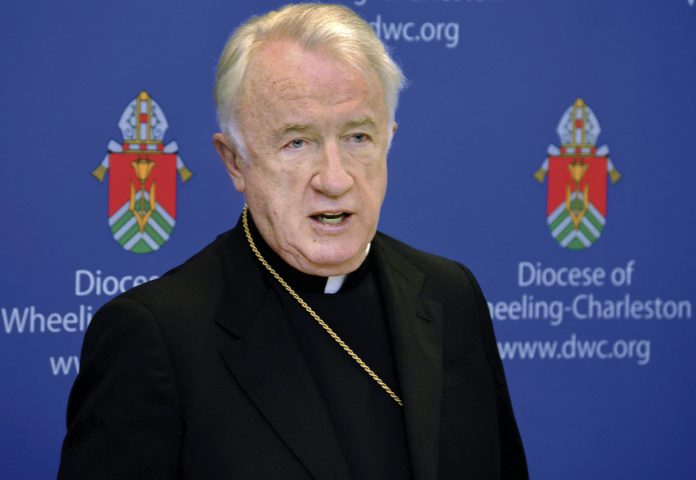Saint of the Day for June 8: Saint William of York (c. 1090 – June 8, 1154)
June 8, 2019Catholic Schools Are Right to Use Morality Clauses, by Hudson Byblow
June 8, 2019
By Phil Lawler, Catholic Culture, June 06, 2019
 Another week, another story about massive corruption in the Catholic hierarchy.
Another week, another story about massive corruption in the Catholic hierarchy.
But there is some relief as well. First, this week’s scandal is not about sexual misconduct. Well, not primarily about sexual misconduct. In his report to the faithful of Charleston/Wheeling, West Virginia, Archbishop William Lori said that there was no conclusive evidence that the former shepherd of the diocese, Bishop Michael Bransfield, had been guilty of sexual abuse of young men. That isn’t exactly wonderful news, because the Lori investigation did not find conclusive evidence of Bransfield’s innocence, either. So the accusations still hover in the background—especially because the Lori report found “a consistent pattern of sexual innuendo, and overt suggestions and actions toward those over whom the former bishop exercised authority.”
Nevertheless it’s a relief to know that we aren’t headed down the same depressing avenue with this story. That’s the good news. The bad news is that Archbishop Lori’s report has given us an entirely new avenue to explore, shining the spotlight on a different sort of episcopal corruption.
But before stepping off down that avenue, let me point out the other good news in this week’s report—and it really is good news. Archbishop Lori has given the people of that West Virginia diocese, and indeed the world at large, a reasonably thorough account of the scandalous behavior that led to Bishop Bransfield’s sudden departure. It’s true that Bishop Bransfield was allowed to resign with dignity, having reached the normative retirement age of 75, when he should have been run out of town on a rail. But it’s also true that as a result of the Lori investigation he has been suspended from ministry. Far more important, the faithful have been given a full explanation for the disciplinary action.
Can you think of another time when a bishop has been removed from office, and Church leaders have given an honest and convincing explanation for the action? I can’t. The letter from Archbishop Lori is a giant stride toward transparency, and toward holding bishops accountable for their behavior. That is very good news.
But I’m afraid that’s all the good news I can offer regarding this story. Now I reluctantly turn to the bad news: the evidence of routine financial corruption.
Bishop Bransfield apparently spent millions of dollars on his own personal comfort. Like some feudal lord, he extracted “gifts” from his subordinates and lavished presents on his superiors. He dealt in cash, and lots of it, sending large checks to American members of the College of Cardinals (Law, Szoka, Wuerl, Dolan, Burke) and to the apostolic nuncios who represented the Pope in Washington, Archbishops Sambi and Vigano. He did not omit to send $10,000 in gifts to his metropolitan, Archbishop Lori—who has now, quite rightly, returned the money to the Charleston/Wheeling diocese.
Did those contributions buy Bishop Bransfield some temporary immunity from questions about his jet-setting lifestyle? I don’t know, but it is hard to resist the notion that his generosity—or rather, the generosity of the faithful in West Virgina—helped Bransfield to curry favor with powerful Church leaders.
We already know that this is not an isolated case. The disgraced former cardinal Theodore McCarrick was a legendary fundraiser, who regularly traveled to Rome to deliver large contributions to Vatican officials, and rode their support into the College of Cardinals. The disgraced founder of the Legionaries of Christ, Father Marcial Maciel, also lavished donations on Vatican officials, who for years stalled off the investigation that eventually exposed his perfidy.
(Here let me pause to note that Cardinal Kevin Farrell, the prefect of the dicastery for Laity, Family, and Life, who has said that he knew nothing about the double life of Maciel (with whom he worked closely), and nothing about the sexual escapades of McCarrick (with whom he lived, and served as vicar general), now has said through a spokesman that he “was not aware of the accusations against Bishop Bransfield…” It’s remarkable, isn’t it, how much Cardinal Farrell didn’t know?)
How widespread is this practice, in which Catholic clerics turn monies collected from the faithful into gifts for high-ranking prelates? Donors to political candidates know that their money will be used to advance the candidate’s personal interests. But we expect something more from our pastors; we expect that our tithes will be used to support the interests of the universal Church.
In what other organization—outside the world of organized crime—do top executives routinely accept large cash gifts from subordinates, or from lower-ranking officials who might rely on their favor? This opportunistic use of money (other people’s money, I might add) is an invitation to corruption. It is already clear that in some cases the offer has been accepted.
How many other, similar cases will eventually come to light? Almost exactly three years ago I predicted that the next great scandal to hit the Catholic Church will involve financial affairs. We are, alas, right on schedule.
____________________________
Phil Lawler has been a Catholic journalist for more than 30 years. He has edited several Catholic magazines and written eight books. Founder of Catholic World News, he is the news director and lead analyst at CatholicCulture.org. See full bio.





 Another week, another story about massive corruption in the Catholic hierarchy.
Another week, another story about massive corruption in the Catholic hierarchy.

